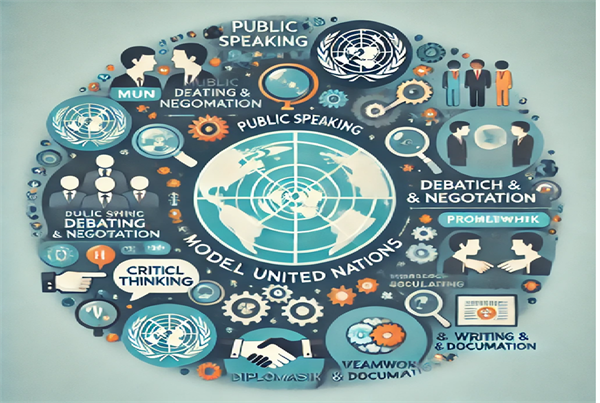
What skills do you gain from Model United Nations?
That first Model United nations meeting is still fresh in my mind. I held on tight to my paper with shaking hands, desperately hoping that no one would call me. After three years, I boldly addressed 200 students as committee chair.
Attending Model UN meetings for a weekend is just the start of what Model UN provides. Speaking on behalf of India, Brazil or Japan or Egypt in a meeting room allows you to develop skills that will benefit you throughout your life.
Through our involvement, our team have led multiple students through MUN participation and frequently notice significant developments in their growth.
You will Find Your Voice
"I am not good public speaker." I have heard this a lot of times. Thereafter, six months later, I see those same students vehemently defending their decisions without any notes.
It's hard to know what to do in Model United nations. You typically only have 30 seconds to get ready to talk. It helps that the framework is formal; phrases like "The delegate yields the floor" make it easy to move from one point to the next.
Something magical happens after your third meeting. What used to be nervous energy becomes presence.
Research Gets Real
Trust us, most of our school projects get forgotten. MUN study stays with you.
If you are representing Cuba, you can't just read a few articles on Wikipedia in the five minutes before the meeting. You need to know everything.
As a student, you ought to be spending weeks on the policy papers for your committee work. Trust me, you will be remembering those details even after the conference finishes.
You will Master the Art of Getting People to Agree with You
In my first committee session, I learned a hard truth: being right doesn't mean you'll win.
Model United Nations forces you to build coalitions. Your brilliant solution to climate change? Meaningless without other countries supporting it. Sometimes this means compromising your position to gain allies. Other times, it means finding creative solutions that address multiple concerns simultaneously.
Your Brain Learns to Think in Systems
Most school problems have easy solutions. MUN deals with more complicated problems in the real world where there are no easy answers.
Should developing countries focus on protecting the earth or growing their economies? What is the right mix between refugee rights and issues of national security? These questions make you examine several points of view concurrently.
At first, the complexity can be too much to handle. Some students get stuck when they try to think about the environmental, social, safety, and humanitarian effects all at the same time. However, this multi-factor analysis gets easier with practice. You start to see links between things that don't seem to have anything to do with each other. This is a very useful skill in any complicated field.
You will Learn How to Disagree
MUN has rigorous policies concerning respect. A delegate cannot label another delegate's proposal stupid in direct terms yet they can use facts and logical arguments for a total refutation.
This education enables adults to defend concepts without harming their peers which most adults never learn. Through the statement "The delegate respectfully disagrees with the position of the United Kingdom" a beneficial conflict between delegates emerges.
Your Writing Is Getting More Sharp
You should try writing a statement that meets the needs of 20 different countries with different goals. Do it in 45 minutes now. While being completely clear and precise.
MUN writing is really pragmatic. Fluffy language and generalizations are criticized right away by other members. Your writing skills improve as you learn to precisely define words, spell out actions, and think of possible arguments.
You Develop Adaptability
"China just changed their position?!" "The committee just received breaking news of a coup?!" Welcome to Model United nations, where curveballs are guaranteed.
Successful delegates don't panic when their carefully crafted strategies collapse. They adapt. Sometimes this means quickly forming new alliances. Other times it means completely reframing the issue.
You will See the World Through Others' Eyes
It's easy to judge other countries' positions from your own cultural perspective. Much harder when you are required to advocate for those positions yourself.
This skill - separating understanding from agreement - is increasingly rare and valuable in our polarized world. Students who excel at Model United Nations develop a nuanced view of global issues that goes beyond simple right/wrong dichotomies.
FAQ
What skills do you gain from MUN?
In order to prepare students for leadership and global awareness, MUN helps them develop their research, critical thinking, teamwork, public speaking, negotiating, and diplomatic skills.
What are the benefits of the Model United Nations?
Benefits of the Model UN include enhanced leadership, communication, and analytical abilities as well as a greater comprehension of international relations and global issues.
What do you gain from Model UN?
Students learn about global diplomacy, problem-solving, and international cooperation while gaining confidence, leadership, research, and negotiating skills from Model UN.
Related Blogs
-
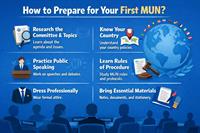
19-Jan-2026 How to Prepare for Your First MUN?
-
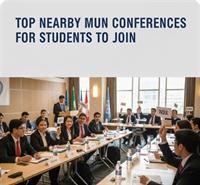
24-Dec-2025 Top Nearby MUN Conferences for Students to Join
-
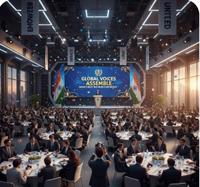
27-Nov-2025 Global Voices Assemble India Next Big MUN Conference
-
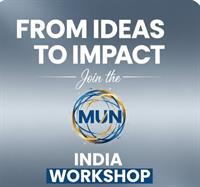
13-Nov-2025 From Ideas to Impact Join the MUN India Workshop
-
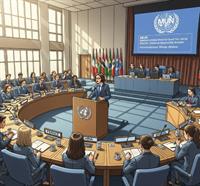
14-Aug-2025 What Is A Conference In MUN?
-
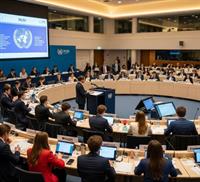
07-Aug-2025 What Does the MUN Do?
-
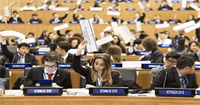
03-Jul-2025 Ways to Research for a Model UN Position Paper
-
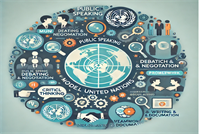
28-Mar-2025 What skills do you gain from Model United Nations?
